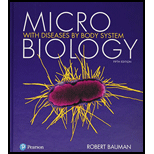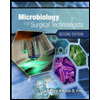
Microbiology with Diseases by Body System (5th Edition)
5th Edition
ISBN: 9780134477206
Author: Robert W. Bauman Ph.D.
Publisher: PEARSON
expand_more
expand_more
format_list_bulleted
Textbook Question
Chapter 22, Problem 2CT
An elderly man is admitted to the hospital with severe pneumonia, from which he eventually dies. What bacterial species is the most likely cause of his demise? What antimicrobial drug is effective against this species? How could the man have been protected from infection? Is the hospital staff at significant risk of infection from the man? Which groups of patients would be at risk if the man had visited their rooms before he died?
Expert Solution & Answer
Want to see the full answer?
Check out a sample textbook solution
Students have asked these similar questions
What did the Cre-lox system used in the Kikuchi et al. 2010 heart regeneration experiment allow researchers to investigate?
What was the purpose of the cmlc2 promoter?
What is CreER and why was it used in this experiment?
If constitutively active Cre was driven by the cmlc2 promoter, rather than an inducible CreER system, what color would you expect new cardiomyocytes in the regenerated area to be no matter what? Why?
What kind of organ size regulation is occurring when you graft multiple organs into a mouse and the graft weight stays the same?
What is the concept "calories consumed must equal calories burned" in regrads to nutrition?
Chapter 22 Solutions
Microbiology with Diseases by Body System (5th Edition)
Ch. 22 - Prob. 1TMWCh. 22 - Why must diphtheria immunization be boosted every...Ch. 22 - Why is it inappropriate to treat a cold with...Ch. 22 - Prob. 1CCSCh. 22 - Prob. 4TMWCh. 22 - Prob. 1EDCSCh. 22 - Prob. 2CCSCh. 22 - Prob. 5TMWCh. 22 - Prob. 2EDCSCh. 22 - Outbreaks of blastomycosis have occurred in Latin...
Ch. 22 - Prob. 1MCCh. 22 - Prob. 2MCCh. 22 - Prob. 3MCCh. 22 - The glycoprotein spikes on influenzaviruses are...Ch. 22 - Prob. 5MCCh. 22 - Prob. 6MCCh. 22 - Prob. 7MCCh. 22 - Prob. 8MCCh. 22 - Prob. 9MCCh. 22 - Prob. 10MCCh. 22 - Prob. 1FIBCh. 22 - Prob. 2FIBCh. 22 - Prob. 3FIBCh. 22 - Fill in the Blanks 4. A drug commonly used to...Ch. 22 - Prob. 5FIBCh. 22 - Prob. 1MTFCh. 22 - Prob. 2MTFCh. 22 - Prob. 3MTFCh. 22 - Prob. 4MTFCh. 22 - Prob. 5MTFCh. 22 - Prob. 1VICh. 22 - Identify the following bacteria discussed in this...Ch. 22 - Prob. 1SACh. 22 - Prob. 2SACh. 22 - Prob. 3SACh. 22 - After listening to a lecture on diseases caused by...Ch. 22 - Prob. 5SACh. 22 - Prob. 6SACh. 22 - Prob. 7SACh. 22 - Prob. 8SACh. 22 - Prob. 9SACh. 22 - Prob. 10SACh. 22 - Prob. 1CTCh. 22 - An elderly man is admitted to the hospital with...Ch. 22 - Compare and contrast viral pneumonia with...Ch. 22 - Prob. 4CTCh. 22 - Prob. 5CTCh. 22 - Compare and contrast antigenic drift and antigenic...Ch. 22 - In mid-November, a worried couple brought their...Ch. 22 - Prob. 8CTCh. 22 - Prob. 9CTCh. 22 - Prob. 10CTCh. 22 - Prob. 11CTCh. 22 - Prob. 1CM
Knowledge Booster
Learn more about
Need a deep-dive on the concept behind this application? Look no further. Learn more about this topic, biology and related others by exploring similar questions and additional content below.Similar questions
- You intend to insert patched dominant negative DNA into the left half of the neural tube of a chick. 1) Which side of the neural tube would you put the positive electrode to ensure that the DNA ends up on the left side? 2) What would be the internal (within the embryo) control for this experiment? 3) How can you be sure that the electroporation method itself is not impacting the embryo? 4) What would you do to ensure that the electroporation is working? How can you tell?arrow_forwardDescribe a method to document the diffusion path and gradient of Sonic Hedgehog through the chicken embryo. If modifying the protein, what is one thing you have to consider in regards to maintaining the protein’s function?arrow_forwardThe following table is from Kumar et. al. Highly Selective Dopamine D3 Receptor (DR) Antagonists and Partial Agonists Based on Eticlopride and the D3R Crystal Structure: New Leads for Opioid Dependence Treatment. J. Med Chem 2016.arrow_forward
- The following figure is from Caterina et al. The capsaicin receptor: a heat activated ion channel in the pain pathway. Nature, 1997. Black boxes indicate capsaicin, white circles indicate resinferatoxin. You are a chef in a fancy new science-themed restaurant. You have a recipe that calls for 1 teaspoon of resinferatoxin, but you feel uncomfortable serving foods with "toxins" in them. How much capsaicin could you substitute instead?arrow_forwardWhat protein is necessary for packaging acetylcholine into synaptic vesicles?arrow_forward1. Match each vocabulary term to its best descriptor A. affinity B. efficacy C. inert D. mimic E. how drugs move through body F. how drugs bind Kd Bmax Agonist Antagonist Pharmacokinetics Pharmacodynamicsarrow_forward
- 50 mg dose of a drug is given orally to a patient. The bioavailability of the drug is 0.2. What is the volume of distribution of the drug if the plasma concentration is 1 mg/L? Be sure to provide units.arrow_forwardDetermine Kd and Bmax from the following Scatchard plot. Make sure to include units.arrow_forwardChoose a catecholamine neurotransmitter and describe/draw the components of the synapse important for its signaling including synthesis, packaging into vesicles, receptors, transporters/degradative enzymes. Describe 2 drugs that can act on this system.arrow_forward
- The following figure is from Caterina et al. The capsaicin receptor: a heat activated ion channel in the pain pathway. Nature, 1997. Black boxes indicate capsaicin, white circles indicate resinferatoxin. a) Which has a higher potency? b) Which is has a higher efficacy? c) What is the approximate Kd of capsaicin in uM? (you can round to the nearest power of 10)arrow_forwardWhat is the rate-limiting-step for serotonin synthesis?arrow_forwardWhat enzyme is necessary for synthesis of all of the monoamines?arrow_forward
arrow_back_ios
SEE MORE QUESTIONS
arrow_forward_ios
Recommended textbooks for you
 Microbiology for Surgical Technologists (MindTap ...BiologyISBN:9781111306663Author:Margaret Rodriguez, Paul PricePublisher:Cengage Learning
Microbiology for Surgical Technologists (MindTap ...BiologyISBN:9781111306663Author:Margaret Rodriguez, Paul PricePublisher:Cengage Learning Comprehensive Medical Assisting: Administrative a...NursingISBN:9781305964792Author:Wilburta Q. Lindh, Carol D. Tamparo, Barbara M. Dahl, Julie Morris, Cindy CorreaPublisher:Cengage Learning
Comprehensive Medical Assisting: Administrative a...NursingISBN:9781305964792Author:Wilburta Q. Lindh, Carol D. Tamparo, Barbara M. Dahl, Julie Morris, Cindy CorreaPublisher:Cengage Learning- Case Studies In Health Information ManagementBiologyISBN:9781337676908Author:SCHNERINGPublisher:Cengage

Microbiology for Surgical Technologists (MindTap ...
Biology
ISBN:9781111306663
Author:Margaret Rodriguez, Paul Price
Publisher:Cengage Learning


Comprehensive Medical Assisting: Administrative a...
Nursing
ISBN:9781305964792
Author:Wilburta Q. Lindh, Carol D. Tamparo, Barbara M. Dahl, Julie Morris, Cindy Correa
Publisher:Cengage Learning



Case Studies In Health Information Management
Biology
ISBN:9781337676908
Author:SCHNERING
Publisher:Cengage
Infection Prevention and Control; Author: thecityoftoronto;https://www.youtube.com/watch?v=jx9sRYmBW3Q;License: Standard Youtube License